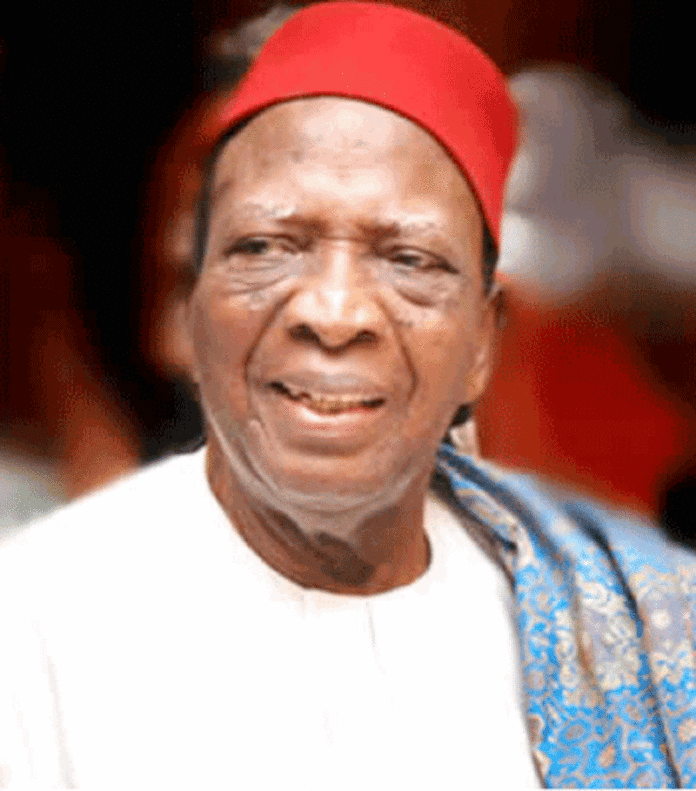By Professor Ben Nwabueze
What made Senator Ovie Omo-Agege to organise such a heinous act
However one looks at it, and whether or not it partakes of the nature of a treasonable act, which is considered later below, the invasion of the Senate and the carting away of its Mace by armed hoodlums are an utterly detestable and lawless act, especially when it is organised and carried into execution by a person occupying such a high-ranking and distinguished position in the government of the country, such as that of a senator. It gives a distinctly evil character and colouration to the crisis of governance we are going through today, and diminishes all the institutions involved in it – the presidency, the security agencies and the National Assembly.
What, then, made Senator Ovie Omo-Agege to organise the monstrous act. The reason given was that he did it because of the feeling of grievance created in him over his suspension for 90 legislative days by the Senate on 12 April, 2018, an action which he thinks the Senate has no power under the Constitution to exact on him. The Senate President, Dr Bukola Saraki, has thrown some light on the reason for the Senator’s suspension. It was not, as alleged, because of Senator Omo-Agege’s involvement, as secretary, in the activities of the Parliamentary Support Group for Buhari in the Senate, or because of his strong opposition in the Senate to the change in the sequence of elections by the Electoral Act (Amendment) Bill. The suspension, he explained, was imposed as a sanction against the Senator for taking the Senate to court which he said “smacks of indiscipline and should not be condoned” : see the Vanguard, 19 April, 2018. But the suspension, whether or not warranted under the Constitution, – the Attorney-General of the Federation, Abubakar Malami SAN, maintains that the suspension is unconstitutional and illegal (Vanguard May 1, 2018) – does not justify Senator Omo-Agege’s senseless and lawless act of organising the invasion of the Senate and carrying away its Mace, which amounts to taking the law into his hands.
The aiders, abetters and co-conspirators in the detestable plot
The despicable plot involved as aiders, abetters and co-conspirators, some senators and persons outside the National Assembly. According to the report in the Vanguard of April 19, 2018, when the Senate resumed sitting after the disruption, Senator Omo-Agege “regularly exchanged banters with fellow members of the Buhari Support Group” present at the Senate meeting. Also his supporters in his home State, Delta State, were reported to have petitioned the national secretariat of the ruling All Progressive Congress (APC) the day before the invasion, protesting what they called “the oppressive and draconian suspension”, warning of a possible breakdown of law and order”. To avoid such a breakdown, they called:
“upon the AGF, the Inspector-General of Police IGP, the Director-General DG of the Department of State Services DSS and all relevant security agencies to promptly move in to enforce the law of the land by allowing Senator Omo-Agege to peacefully resume the work our people elected him to do for them”.
“As Elders and Leaders, we have been labouring to control our youths over the great anger being generated across the land because of this oppressive and draconian suspension”.
Another actor in the incident, one Lucky Ajos, speaking on behalf of Senator Omo-Agege, said:
“Based on legal advice and his understanding of the current position of the law, Senator Omo-Agege today (yesterday) resumed work and sitting with his colleagues. A few champions of the unconstitutional, invalid and tyrannical suspension tried to stop him but those who opposed it welcomed and protected him throughout the sitting. We are grateful to the many distinguished senators who stood by Senator Omo-Agege”.
Whether, in all the circumstances, the invasion of the Senate and the carting away of its Mace by armed hoodlums are in the nature of a treasonable act
The invasion of the Senate and the carting away of its Mace by armed hoodlums are rightly decried in the words of the Deputy Senate President, Senator (Dr) Ike Ekweremadu, as “an affront on the Senate, it is an affront on democracy, it is an affront on the National Assembly.” The affront is so manifest as cannot be gainsaid.
But is the incident more than an affront? Speaking on the matter, Senator Abdullahi Sabi described the incident as “an act of treason, as it is an attempt to overthrow a branch of the Federal Government of Nigeria by force”. The language of the honourable Senator has, as expected, excited divergence of opinions. An informed judgment calls for a close examination of all the circumstances and facts, beginning with the issue whether the incident amounted to an invasion of the Senate. An invasion seems established by the facts which, as shown on the television, portray it in the image of an act of war or, at all events, a war-like act. An invasion is defined by New Webster’s Dictionary of the English Language as a “hostile incursion or intrusion by force.” There was undeniably a hostile incursion or intrusion by force of arms into the Senate. By the act of invasion, as defined above, Senator Omo-Agege and his hoodlums had levied war or aggression against the Senate.
Next the exact position of the National Assembly in the government of Nigeria needs to be elucidated. In this connection and for present purposes, the description of the National Assembly as “a branch of the Federal Government of Nigeria” tells us little, if anything at all, about the nature and role of legislative authority in government. Legislation is not only the most potent instrument of coercion, it is also the most far-reaching and crucial power in the government of society. It is the expression of the supreme power in the state, the distinctive mark of a country’s sovereignty, and the index of its status as an independent state. Thus, the sovereign power in a state is identified in the organ that has the power to make laws by legislation. The legislature is therefore the sovereign organ of state power. As the hallmark of a country’s sovereignty, legislative power is a plenary power and as such has no inherent limits, that is to say, no limits flowing inherently and inexorably from its nature; it is subject only to such extrinsic limitations as may be imposed on it by the supreme law of a written constitution or by established convention.
Thus, a legislature, like the British Parliament, which is not subject to the supreme law of a written constitution by which it is created and its powers defined and ipso facto limited, can legally exercise the sovereignty of the nation reposed in it in any way and for whatever purposes it chooses; it can, in theory, at any rate, do anything it likes, except, of course, things that are physically impossible, like turning a man physically into a woman, or a woman into a man, but it can provide that a man shall be deemed – notionally, that is – to be a woman or vice versa. Judged alone by the nature and role of legislation in the government of society, the legislature should have primacy over the executive, but primacy between them is dictated by the consideration that the President under our Constitution is not only the chief executive but also the Head of State, as discussed earlier.
So the issue raised concerns the National Assembly, not as just a branch of the Federal Government of Nigeria but as the sovereign organ of state power, as the hallmark of our sovereignty as an independent country which, as the facts show, was attacked, assailed, and put out of action by armed force exacted by hoodlums, albeit for a short duration of time, intended to intimidate, overawe and force it to change or reverse the suspension of Senator Omo-Agege. The character of the incident, as a war-like operation or situation is not determined by its duration, but by its object or intention, which, as just stated, was to put the Senate out of action in the belief, which is erroneously held, that carting away its Mace would achieve the purpose.
Given thus an armed invasion of the Senate in a war-like operation perpetrated with the intention of holding up its proceedings and putting it out action, the incident does partake of the nature of a treasonable act, but it is treasonable felony not treason; and is punishable with imprisonment for life, unlike treason which carries the death penalty. Under the Criminal Code, section 41, it is treasonable felony for a person to “form the intention” of levying “war against Nigeria and to manifest such intention by overt act” in order, by force or constraint, “to intimidate or overawe any House of the National Assembly”. Thus, the invasion of the Senate and the carting away of its Mace by armed hoodlums in a war-like operations thereby holding up its proceedings and putting it out of action with the intention to overawe and intimidate it to change or reverse the suspension of a member, is a treasonable felony within the meaning of section 41 of the Criminal Code.
Professor Ben Nwabueze
Lagos, 7 May, 2018







![[UPDATED] Catholic priest arrested by police for alleged shooting, killing boy over New Year fireworks [UPDATED] Catholic priest](https://thenicheng.com/wp-content/uploads/2025/01/du-ty-100x70.png)





